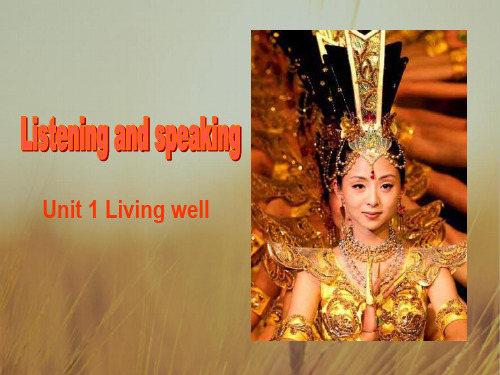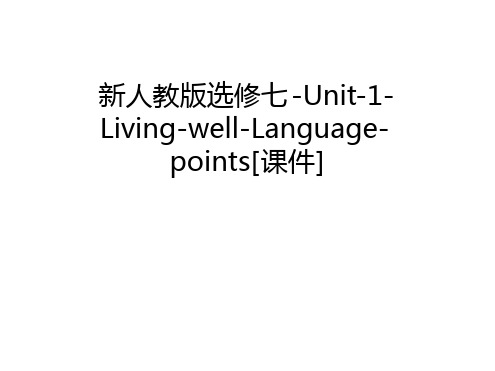人教新课标_选修7_Unit1_Living_well-Using_language
- 格式:ppt
- 大小:1.69 MB
- 文档页数:34


人教版教材选修七第一单元Living Well-Using LanguageA Letter To An Architecture教学设计课题名称:Using language课型:阅读写作课授课年级:高二年级(下)主题语境:人与社会——关爱残障人士教材内容分析一、教材内容:本课为人教版教材选修七第一单元Living Well的第五课时Using Language 板块的第二项活动Reading,Speaking & Wring.本单元的话题是围绕“残疾”、“残疾人的生活”展开的,介绍残疾人积极进取的生活。
教材上这部分共有六个练习,练习1看图说话,讨论行动困难的人在电影院可能会遇到什么麻烦。
练习二要求学生阅读一封信件,内容为一位读者写给电影院建筑师的信,请求建筑师充分考虑残疾者的需求,然后让学生把心中的建议要点列举出来。
练习三回答问题。
练习四要求学生找出信中的礼貌用语。
练习五分组讨论社区是否方便残疾人进出以及改进的方法。
练习六要求学生仿照读过的信件给某建筑师写一封建议信。
二、阅读文本分析:WhatReading部分呈现的是一封较为正式的写给一位电影院建筑师就新影院的设计的建议信,内容主要包括:1. 写信目的——考虑残障人士的需求;.2. 包括电梯设计(Adequate access for wheelchairs),耳机配置(Earphones for people who have trouble hearing),座位高度(Raised seating),厕所位置(Toilets)以及停车场位置(Car parking)等五个方面的建议;3. 表示感谢和期待,并表明合理设计的原因——利于残障人士也利于电影院的双赢局面。
How1. 结构上。
Reading在结构上采取了总分总的布局,先说明写信目的,随后从一些细节上体现对残障人士可能遭遇的问题的考虑而提出可行性建议,最后总结表示希望建议得到认可并进一步提出双赢的预期效益。

教学准备1. 教学目标知识目标 To master the useful expressions and sentences in the text.能力目标 To learn the text well and improve students’ reading ability.情感目标 To be positive and strong-minded when in trouble.2. 教学重点/难点重难点句型 1. Every time I returned after an absence, I felt stupid because Iwas behind the others.2. As well as going to the movies and football matches with friends, I spend a lot of time with my pets.3. I have a very busy life with no time to sit around feeling sorry for myself.4. Just accept them for who they are, and give them encouragement to liveas rich and full a life as you do.3. 教学用具4. 标签教学过程Step I: Display the preview workAsk several students to write down the preview work on the blackboard. Then check the answers together and remember them after class.Step II: Lead-inT: Well down. All of you did good jobs. I’d like you appreciate a picture. Please look at the screen. Dou you know him?S:T: His name is Nick Vujicic. From this picture, we can see he has no arms and legs, but a small foot. Would you like to know more about him? Let’s see a short video.T: Nick is positive and he tells us the disabled can live well. Inthis class, another disabled person Marty will tell us his story. Let’s come to Marty’s storyStep Ⅲ: Reading comprehensionTask1:Fast readingT: Skim the text to match the main idea of each paragraphPara.1 a) Marty met with a lot of difficulties at schoolPara.2 b) How his life has become easierPara.3 c) The advantages of his diseasePara.4 d) An introduction to Marty and his muscle diseasePara.5 e) How his disability developedTask2: Detailed readingT: Since we know the structure of the text, let’s learn some details about Marty. Read paragraph1 quickly and finish exercise2.1. When Marty says “I am one in a million”, he really means _____.A. he is uniqueB. he has a rare diseaseC. he has a muscle diseaseD. he lives a hard but happy life2. What does “live one day at a time” mean?T: Although Marty developed a rare disease, he is also optimistic. Can doctors cure him of his disease? With this question, let’s read paragraph2&3 and deal with exercise3.1. Why did the doctors cut out a piece of muscle from Marty’s leg?A. Because they could cure the disease by cutting it out.B. Because they wanted to use it as a specimen (标本).C. Because they would transplant (移植) the new muscle.D. Because they wanted to find out the cause of the disease.2. Which sentence can be replaced by the following one?After many tests in hospital, doctors still can’t find out the cause of the disease. And I don’t know what will come up in the future.T: It is a pity that doctors can’t find out the cause. If you were Marty, what would you do?S:T: What about Marty? Let’s come to paragraph4 and finish exercise4.1. What are Marty’s ambition, achievements and hobbies?T: Are you inspired by Mary’s positive attitude? If you meet a disabled person, what would you like to do? Marty not only achieved great success but also had something to tell us. Then read last paragraph and write down the answers about exercise5.2. What are Marty’s suggestions to healthy children?Task 3: Further readingT: After reading this text, what kind of person do you think Marty is?S:T: Excellent! Let’s read the text for the third time and have abetter understanding of Marty’s story.T: Work in pairs and deal with exercise 6.1. Every time I returned after an absence, I felt stupid because I was behind the others.2. As well as going to the movies and football matches with friends,I spend a lot of time with my pets.3. I have a very busy life with no time to sit around feeling sorry for myself.4. Just accept them for who they are, and give them encouragement to live as rich and full a life as you do.Step IV: SummaryT: According to Marty’s Story, fill in the blanks.Marty has a muscle disease that makes him very weak. Sometimes he is very (1) __________ and drops things or (2)________ into furniture. However he is very (3) ___________ and has learnt to(4)______________ his disability.Though (5) _________, he doesn’t look any different from others, so sometimes some children in his primary school would laugh at him. When he got (6) ______________after running a short way. His life is a lot easier at high school because his (7) _______ students have accepted him.(8)_______________, he has a good life, he is happy to have found many things he can do. His (9) __________ is to work for a firm that develops computer (10) ________ when he grows up.Step V: Free debateT: Do you know how many disabled people are there in China?S:T: Let’s look at the screen. Do you think disabled people can live a happy life like normal people now?S:T: I’d like to divide you into 2 parts. Some are for it while the others are against it. Work in group and have a debate.S:T: Different people have different opinions. They are physically disabled, but mentally strong. I firmly believe they can live well. At last, One sentence for you from Tai Lihua--Hope you can be cheerful and positive when you meet with difficulties in the future.课后习题作业1. Review what we have learnt.2. Write a short article about whether the disabled can live a happy life.。

人教版新教材选修7Unit1 Living wellReading Marty’s Story宁德市高级中学郭海平一、教材分析本教材是人教版新教材选修7 Unit1 Living well (Reading Marty’s Story)本单元的中心话题是“残疾”,具体涉及“残疾人的生活”,“如何关心残疾人”等。
语言技能和语言知识都是围绕:“残疾”这一中心话题设计的。
本部分是该单元的主要阅读材料,既具备了大量的信息又集中了有用的词汇和语言结构,文章通过马蒂在网页上讲述自己的故事引导学生去体会马蒂的情感变化,提高他们关心,理解,帮助他人的意识。
前面的Warming up 是该部分的铺垫,引导学生谈论对“残疾”这一话题的看法,让学生了解一些残疾人的成就,并组织简短的讨论,后面的几个部分都是Reading的延伸和扩展。
所以说Reading部分承载了本单元的主要信息以及起到承上启下的作用。
二、三维目标(1)Target language语言目标a、重点词汇和短语disabled,beneficial,clumcsy,motto,microscope,absence,stupid,fellow,annoyed,in dustry,tank,independence,encouragement,in other worse,adapt to,out ofbreath,absence from school,fellow students,all in all,get annoyed,make fun ofb、重点句式They can’t tell me whether I will get worse as I get older,or I will stay the same as I am today.Every time after a long absence from school,Ifeel really stupid because Iam abit behind the others.As well as going to the movies and football matches with my friends when I am well enough,I spend a lot of time with my petsIn many ways my disability has made me grow stronger and more independent.(2)Ability goals能力目标1) 掌握提取信息,分析信息,解决问题的能力。


人教版高中英语选修7《Unit 1 Livi ng well》教案2篇Teaching plan of unit 1 living well编订:JinTai College人教版高中英语选修7《Unit 1 Living well》教案2篇前言:英语作为在许多国际组织或者会议上都是必需语言,几乎所有学校选择英语作为其主要或唯一的外语必修课。
英语教学涉及多种专业理论知识,包括语言学、第二语言习得、词汇学、句法学、文体学、语料库理论、认知心理学等内容。
本教案根据英语课程标准的要求和教学对象的特点,将教学诸要素有序安排,确定合适的教学方案的设想和计划、并以启迪发展学生智力为根本目的。
便于学习和使用,本文档下载后内容可按需编辑修改及打印。
本文简要目录如下:【下载该文档后使用Word打开,按住键盘Ctrl键且鼠标单击目录内容即可跳转到对应篇章】1、篇章1:人教版高中英语选修7《Unit 1 Living well》教案2、篇章2:人教版高中英语选修7《Unit 1 Living well》教案篇章1:人教版高中英语选修7《Unit 1 Living well》教案教学准备教学目标教学目标(这部分谢3点,按照USE的目标写)(1)学习建议信的结构、语言。
(2)讨论学校建筑物设计中行走不便的学生的需求。
(3)给校长写一封建议信。
(4)继续培养对残疾人的尊重和关爱意识。
教学重难点教学目标(这部分谢3点,按照USE的目标写)(1)学习建议信的结构、语言。
(2)讨论学校建筑物设计中行走不便的学生的需求。
(3)给校长写一封建议信。
(4)继续培养对残疾人的尊重和关爱意识。
教学过程Step 1Warming-up and lead-in (5 mins)(1)导入用本单元的阅读文Marty’s story来导入,引出残疾人的话题。
T: Hello, class. Inthe last lesson, we learnt Marty’s story. What’s the problem with Marty?(He has a raremuscle disease.)Yes, he’sdisabled.But is Martyleading a miserable life due to his disability?(No.)He is leading afulfilling life due to his own efforts. The disabled can live as good andcomfortable a life as we do. But it calls for more efforts.(2)揭题教师通过展示我们学校的图片以及通过采访班上一位曾经有行走困难的学生,点出学校有些地方可能对行走困难学生带来不便。
教案6 Unit 1 Living WellListening and WritingTeaching goalsEnable the students to listen for details and catch the specific information as much as possible.Learning ability goalsEnable the students to predict some important information in the process of listening and encourage the students to talk about the situations according to the listening materials.Teaching important and difficult pointsHow to make sure the answers of listening material and help them to describe the disaster they have experienced.Teaching aidsA recorder and cassette tapes, a projector, and a computerTeaching proceduresStep1 Warming upMount Kilimanjaro 乞力马札罗山Kilimanjaro is the highest mountain in Africa and the tallest freestandingmountain known to man. It is a mountain where you can hike for more t han 90 kilometers, gain 4000 meters in altitude, traverse rain forest, moor land, alpine desert, snow fields and ice cliffs, all virtually on the equator!A truly unforgettable and fascinating adventure.Step2 ListeningT: Barry Minto has just made a successful climb of Mount Kilimanjaro i n Africa. Listen to him being interviewed on the radio.①First ListeningListen to the tape and tick the statements that are true.1. Barry is blind.2. Barry is between 25-45 years old.3. The blind climbers got assistance from sighted companions.4. More of the sighted group reached the top of the mountain than those who were blind or weak-sighted.5. Next year Barry is going to climb Mount Qomolangma.1-5 TFTFF②Listen for the second time and fill in blanks.Interview with Barry MintoAge of the blind and weak-sighted climbers______Age of the sighted companions_______________Height of Mount Kilimanjaro__________________Number in the disabled group________________Number of the disabled who reached the top of mountain__________ Number in the sighted group______________Number of the sighted who reached the top______Number of days to climb the mountain__________Number of days to come down the mountain_____Keys:16-19; 25-45; 5,900 meters; twelve; nine; fifteen; seven; 5 days; 2 days③Listen to the latter part of Barry’s story where the interview congratulat es Barry and wishes him future success, then c omplete Joan’s sentences. Barry: Of the 15 sighted climbers, only 7 made it.Joan: Oh, _____________!Barry: Yes, it just shows you______________________________________…Joan: Well, Barry. I’m full of admiration for you and your companions. Y ou have achieved something quite remarkable.Barry: Thanks. We’re _____________________.Joan: Mm, _____________. So, Barry, what’s your next big challenge? Barry: My ambition is to climb Mount Qomolangma one day.Joan: Amazing. I wish you____________________________.Keys:well done; how determined the blind climbers were; very proud of oursel ves; you should be; every success in the futureStep 3 Wishes & congratulationsSlide showUseful ExpressionsCongratulations.All the best.I’m proud of you.I wish you success.Good luck.Well done.I’m very impressed by your performance.You have my best wishes.I’m very pleased for you.I hope it goes well for you.That’s wonderful/amazing.Step4 ReadingScan the text and write a mini bio for Zhang Yuncheng.Step 5 WritingWrite a short text of 150 words about Zhang Yuncheng.A sample of the writingZhang Yuncheng, born in 1980 in Heilongjiang, is the writer of the best seller “If I can walk for three days”.He has a disease which affectsout of his muscles in his body. He developed the disease at the age of 3. Because of his health condition, he went to school for only one day.So Yuncheng stayed at home and over the years, his condition got worse and worse. At 16, he could not walk at all. At 18, he could not get his bed. At 20, he could not raise his arms above his head. However, Yunch eng’s disease has not stopped him making most of his life. He taught hi mself to read and write.He loves reading and writing and wants to become a writer. With the help of Zhang Danuo, an editor, at the age of 25, Yuncheng achieved his ambition to write and publish a book.Step 6 HomeworkRevise the writing.。
新课标人教版 Unit 1 Living well 好好生活核心词汇1.The teacher’s words were a great____________(鼓舞)to him.2.He has a(n)____________(伤残)pension because he lost his legs while he was in the army.3.Please look after my house during my____________(缺席,不在).4.A few weeks’____________(社区)service can make sel fwilled teenagers into cooperative and caring members of society.5.This method of measurement is ____________(适合的)for most island waters and coastal areas.6.We are____________(管理,执行)a survey of consumer attitudes towards organic food. 7.As we know,the Internet helps people have easy____________(方法,接近)to all kinds of information.8.用ambition的适当形式填空(1)You have to let people know you are____________and waiting for bigger and more rewarding challenges.(2)His ____________was to meet his favourite pop star face to face.9.用benefit的适当形式填空(1)The improvement in sales figures had a____________effect on the company as a whole.(2)The discovery of oil brought many ____________to the town.(3)They are working together to ____________the whole community.10.用annoy的适当形式填空(1)It really____________me when people expect me to tip as well as pay a service charge in a restaurant.(2)My parents were rather____________that I hadn’t told them about the accident.1.encouragement2.disability3.absencemunity5.suitable6.conducting7.Access 8.(1)ambitious (2)ambition 9.(1)beneficial (2)benefits (3)benefit 10.(1)annoys (2)annoyed高频短语1.________________ 换句话说2.________________ 适合3.________________ 切去;省略;停止(做某事)4.________________ 上气不接下气5.________________ 总而言之6.________________ 闲坐着7.________________ 和;也8.________________ 在很多方面9.________________ 取笑10.________________ 不必担心11.________________ (口语)(祝你)一切顺利12.________________ 遇到;经历;会晤1.in other words2.adapt to3.cut out4.out of breath,5.all in all6.sit around7.as well as8.in many ways,9.make fun of 10.never mind11.all the best 12.meet with重点句式1.Unfortunately,the doctors don’t know ____________,but I am very outgoing and have learned to____________my disability.不幸的是,大夫们不知道如何治好我的病,但是我很开朗乐观,学会了适应身体的残疾。